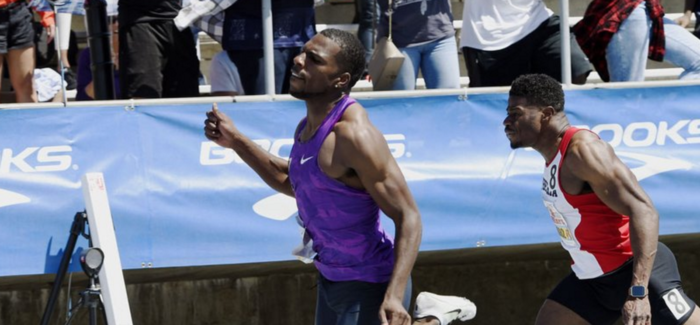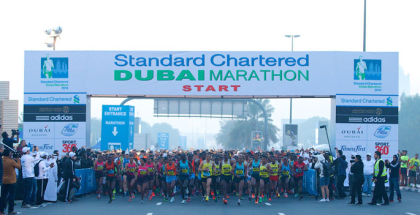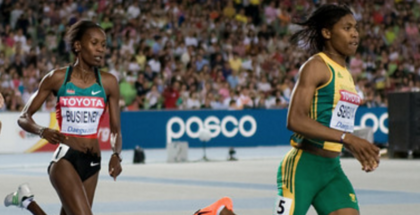Baysa goes stealth to win Boston, brewing Semenya storm and saying goodbye to the best nickname in T&F
Kevin Sully | On 19, Apr 2016
Photo via Track and Field Photo
Here’s the good news track and field– doping might not be the main story hanging over the sport heading into the Olympics. This seems like an impossibility with Russia currently suspended, Kenyan and Ethiopia under pressure and a spate of positive tests for a drug that it seems WADA doesn’t even understand. But here comes the more complicated news–the drug problems aren’t going away, they just could be overshadowed by the case involving Caster Semenya.
Semenya tripled at the South African Championships on Saturday winning the 400m in 50.76, the 800m in 1:58.54 and the 1500m in 4:10.93. The wins in the 400m and 800m came just 50 minutes apart.
Ever since her gold medal in the 800m at the 2009 World Championships, Semenya’s career has mirrored the sport’s policy toward female athletes with hyperandrogenism. She was dominant in 2009 and began to regress in 2011 when rules were instituted to lower testosterone levels for women with hyperandrogenism.
In 2015, that rule was suspended by the Court of Arbitration in Sport for at least two years, allowing impacted athletes to compete without undergoing hormone therapy to regulate testosterone.
This was the backdrop for Semenya’s triple and is the subtext as she moves toward the Olympics. Her 800m on Saturday was her fastest since 2012. She’s not a 400m specialist, but she set a personal best in that race by two seconds. For a few hours this weekend, she was the world leader in both events–a rare feat even considering it’s still very early in the season.
Even if she doesn’t get any faster between now and August, she is fast enough to make a significant impact in the Olympics. A steady improvement through the summers puts her in good position for gold in the 800m.
Since 2009 when Semenya won the World Championships her case has created plenty of ethical/scientific arguments. Both of these pieces provide a good look at the issue and speak to the complexity of creating a policy that satisfies everyone. Strictly from a competition standpoint, Semenya’s triple puts her, and CAS’s decision, back in the spotlight. 1:58 brings attention that 2:01 does not. CAS isn’t going to change their mind before the Olympics so there will surely be more to come throughout the summer.
Ok, the other standouts from the week below including results from the Boston Marathon, Mt. SAC Relays and the Chris Brown Bahamas Invitational.
The Medalists
The top three performances of the week…
Gold: Atsede Baysa
Baysa went into stealth mode at the 16th mile of the Boston Marathon. She let go of the lead pack and waited until there were less than five miles remaining to make a push for the front. With 4.5 miles left, she was 37 seconds behind. She turned that into a 44 second victory, winning in 2:29:19.
There was no drama when she passed Tirfi Tsegaye and Joyce Chepkirui–at that point it looked like Baysa was running the marathon relay and had just started her leg, while Tsegaye and the others labored through the final 10 kilometers. Baysa ran 16:43 from 35-40K, by comparison Tsegaye went 17:27. The difference in the final two kilometers was even more stark. Baysa covered it in 7:30, Tsegaye in 8:07. This way of running isn’t common or even recommended. Usually if you get dropped by the lead group at mile 16 then you aren’t going to return. But this turned out to be the perfect strategy for a warm day in Boston.
Silver: Lemi Berhanu Hayle
In a cautious race, Hayle outlasted Lelisa Desisa to win in 2:12:44. Hayle won last year in Dubai and finished runner-up so it wasn’t unexpected that he was the man to prevent Desisa from winning his third title. This win, and the Dubai performances, should thrust Hayle into an Olympic spot, but much still depends on what happens Sunday in London. Desisa’s outlook is also murky (more on that below).
Hayle and Baysa’s wins gave Ethiopian a sweep of the titles for the first time in the race’s history. That sounds cool, but doesn’t mean much when you see who Kenya has running in London on Sunday.
Bronze: Lashawn Merritt
In the Bahamas, Lashawn Merritt won the 200m in 19.78, his fastest time ever.…….checking Olympic schedule to see if a men’s 200/400m double is possible……..it is! …and with one day rest in between the finals of the 400m and the first round of the 200m.
Co-host Jason reminds me that you don’t switch into a Bolt event, but with Merritt’s primary event coming first it’s not a ridiculous proposition. What might be the bigger problem is Merritt’s tendency to race every 400m on the planet each year. If he keeps that up, piling on some 200s might be too much. Perhaps he will swap out some of the 400s for the 200s to limit his racing load.
The 200m speed helps him match with Wayde Van Niekerk. For someone who looked like his peak was 2008-2009 Merritt isn’t going quietly into his later years. He turns 30 in June and his personal bests in the 200m and 400m have both come in the last nine months.
Surging….
-Jenna Prandini
Prandini ran 10.95 with a favorable +1.7 wind at Mt. SAC. That’s faster than everyone at the meet in the Bahamas and is the first sub 11 of the season.
-Ameer Webb
Webb doubled up with two wins in Mt. SAC– a wind-aided 9.90 in the 100m and a legal 19.91 in the 200m. In the 100m he notched probably the most impressive “win” of the weekend– finishing ahead of Andre De Grasse who ran 10.04. Though it was wind assisted, it matched Justin Gatlin’s 9.90, which had a +2.3 m/s behind it.
-The men’s 400m
Merritt’s 200m time opens up a whole new realm of possibilities. He appeared to have a disadvantage on pure speed against Wayde Van Niekerk, but 19.78 is plenty fast. Van Niekerk himself has already broken 10 seconds for the 100m this year and ran 44.98 at the South African championships.
The third name, and the one who was the best in the world at this point last year, Kirani James isn’t backsliding after finishing third at the World Championships in 2015. James ran 44.36 in the Bahamas and beat Tony McQuay by almost a second. It’s only April though and it looks like we either are going to see a 400m season for the ages, or one or two of this group will sputter and run out of gas mid-summer.
-The potential of the men’s 200m
If it wasn’t treated like the half-marathon of the sprints, it would be such a great event on a weekly basis. Grabbing the runners who specialize in the 100m and 400m and putting them at an intermediate distance is fascinating. Sure, Usain Bolt would still be the best, but the fields would be better than their usual composition of maybe one star and then runners who couldn’t get into the 100m.
Now that we know that Merritt can run under 19.8, he’d be a fun addition. Throw in Justin Gatlin, Wayde Van Niekerk, Andre De Grasse, Merritt and Bolt and the 200m could really pop–and not just once a year.
-Asbel Kiprop
Kiprop at altitude is a lot like Kiprop at sea level. He apparently (I say apparently because there were a couple different times reported) ran 1:43.65 in an 800m in Eldoret.
In a weekend of infinite possibilities throughout the track world, this mark stands out. You shouldn’t extrapolate his 1500m world record potential from one 800m race at altitude in April, but you know you will. How long until Monaco?
-Duane Solomon
Two years ago at Mt. SAC, he ran an unassisted (no rabbits) 1:43. Saturday wasn’t as quick, but 1:45.47 and a win isn’t a bad way to start a season. It’s also an indication that Solomon is on the way back to where he was in 2014.
If he does get into the 1:42/1:43 range then the U.S. Olympic Trials men’s 800m goes from “still pretty awesome because it’s a championship 800m race” to “BerianSolomonSymmondsLoxsomandwhoknowswhoelsemygodthisisfun….”
I prefer the latter.
-American high hurdlers
Three of the top six in both the men’s and women’s fields competed in the Bahamas. David Oliver ran 13.30 and beat Aleec Harris and Jason Richardson. In the women’s race, Queen Harrison ran 12.64 to beat Sharika Nelvis and Jasmine Stowers. All times wind-aided, but who cares it’s the hurdles?
-Yohan Blake
Last week it was Walter Dix, now it’s Blake. Welcome back to 2011!
WL: VIDEO: @YohanBlake 9,95 (1,4) – 100 meter – #MVPTrackMeet. pic.twitter.com/P4uMZbFc3t
— Friidrottsnyheter (@AthleticsSweden) April 17, 2016
That’s not entirely accurate for Blake, he was great in 2012 as well before getting injured and disappearing for most of the last three years only popping up to run an occasional 20 second 200m. He has returned just in time. And with it comes his claws, awesome socks, $500,000 watches and maybe some Jamaican competition for Usain Bolt.
Slowing….
-The Beast
But wait, Blake may be back….his nickname, sadly, is not. He said after his 9.95 that, “my coach they have been talking to me, you know you have to get rid of that name (Beast), the beast, that’s holding you back so I get rid of that name now so it has been good.”
Is this the first time a nickname has been cited as the source of an athlete’s struggles? How desperate for a solution do you need to be for you to consider throwing out your nickname? If it means Blake will be on the start line from now until August, then I will begrudgingly accept.
Welcome back Yohan. RIP, Beast.
-Lelisa Desisa
Second in the Boston Marathon is a fine result, especially in the warm and windy conditions. The problem was Desisa entered the race with the most to lose. Anything less than a victory damaged his position as best Ethiopian men’s marathoner. I still think he is their best chance for a medal in the Olympics. He’s consistent, experienced and competes well in championship style races. But in the minds of fickle Olympic selections? It’s possible. Leaving him off the team wouldn’t be the worst decision Ethiopia has made in picking an Olympic team.
Hayle has now most likely moved in front of him in the pecking order. If a couple of his countrymen run quickly in London, Desisa could drop out of the picture.
Twitter Questions
Send them to @HouseofRun on Sundays
-Would you trade indoor season for a longer outdoor season i.e. Southern Hemisphere tour in Australia & South Africa?
@jufreeze
If there was outdoor track from January through March, I think it would look pretty similar to what we see during the indoor season. There wouldn’t be the off distances, and perhaps some distance runners would try to get their qualifying standards out of the way early and enter a 5000m or 10,000m, but I think the intensity would be subdued because of fear of injury or an early peak.
I’d be all for an extended outdoor season if resembled the regular outdoor season. I don’t think that is a likely result so I’ll stick with indoors. I’m not making that choice because of a necessity to uphold tradition or because it serves a vital purpose to track. I do think indoor’s idiosyncrasies make it fun, especially if you are able to get to a meet in person.
-Two women (Miller and Hayes) ran sub-50 Saturday. What time do you think it’ll take to win the 400m Olympic final?
@IHeartIdol
I always overshoot 400m predictions so why stop now? Nobody has broken 49 seconds since 2009. Other than Sanya Richards Ross and Ana Guevara, nobody has run in the 48s since 1996. I think that changes this year.
With Allyson Felix and Shaunae Miller(49.70 this weekend) up front (and possibly Caster Semenya) and a group including Hayes, Courtney Okolo and Francena McCorory close behind, it’s going to take something very quick to win in Rio (fast track permitting). I’m not relay split conversion expert, but Felix’s 47.72 leg on the 4 x 400m last August has to mean she’s capable of running under 49 seconds.
Final answer, 48.97. Remind me of this in August after 49.4 wins gold.



















Submit a Comment